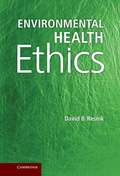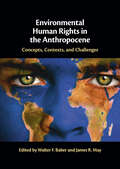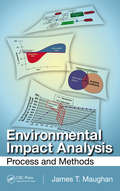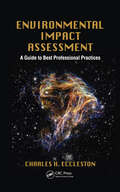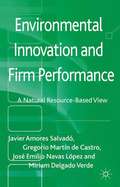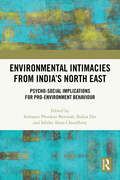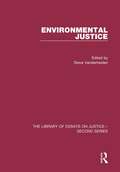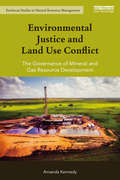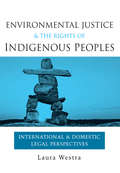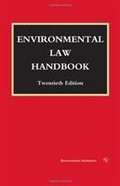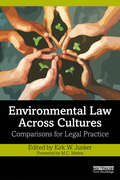- Table View
- List View
Environmental Governance in Europe and Asia: A Comparative Study of Institutional and Legislative Frameworks (Routledge Research in International Environmental Law)
by Jona RazzaqueThis book looks at environmental governance in both Asia and Europe and offers a comparative analysis of the two regions in order to provide a better understanding of the concept of ‘environmental governance’ and its status in Europe and Asia. The book assesses the legislative, institutional and participatory mechanisms which affect the overall development of environmental governance, and analyses current issues, concerns and strategies in respect of environmental governance at the local, national, and international levels. The rapid changes in economic, social and political life have had an enormous impact on Asia’s ecosystems and resources. Asian countries, in the name of economic development, are following the same environmentally destructive path their European counterparts followed in the past. The key to the environmental future of these two regions lies in the evolution of the character of governance - the ensemble of social ethics, public policies and institutions which structure how state actors and the civil society interact with the environment. This book will be valuable to scholars and students of environmental politics, EU and Asian studies, public policy, environmental law, and to decision makers and policy analysts.
Environmental Governance of Invasive Species: An EU Perspective (Routledge Research In International Environmental Law Ser.)
by Donato GualtieriThe consequences of the introduction and spread of invasive alien species in non-native ecosystems is an area of growing interest for international policymakers and regulators. Globalisation has increased the rate and magnitude of biological invasions, resulting in huge environmental, economic and social costs. Until recently, the effectiveness of international efforts to provide a coordinated response to the threat of alien invasions have been limited. This book considers the existing Multilateral Environmental Agreements and looks at the potential role of regional environmental governance, particularly in consideration of the adoption of the European Parliament and Council regulation 1143/2014 on the management and control of invasive species, to provide an effective response to this global threat.
Environmental Health Ethics
by David B. ResnikEnvironmental Health Ethics illuminates the conflicts between protecting the environment and promoting human health. In this study, David B. Resnik develops a method for making ethical decisions on environmental health issues. He applies this method to various issues, including pesticide use, antibiotic resistance, nutrition policy, vegetarianism, urban development, occupational safety, disaster preparedness and global climate change. Resnik provides readers with the scientific and technical background necessary to understand these issues. He explains that environmental health controversies cannot simply be reduced to humanity versus environment and explores the ways in which human values and concerns - health, economic development, rights and justice - interact with environmental protection.
Environmental Health in International and EU Law: Current Challenges and Legal Responses (Routledge-Giappichelli Studies in Law)
by Stefania NegriThis book presents a broad overview of the many intersections between health and the environment that lie at the basis of the most crucial environmental health issues, focusing on the responses provided by international and EU law. Consistent with the One Health approach and moving from the relevant international and EU legal frameworks, the book addresses some of the most important issues of environmental health including the traditional, such as pollution of air, water and soil and related food safety issues, as well as new and emerging challenges, like those linked to climate change, antimicrobial resistance and electromagnetic fields. Applying an intersectoral and interdisciplinary approach, it also investigates other branches of international and EU law including human rights law, investment law, trade law, energy law and disaster law. The work also discusses ethics and intergenerational equity. Ultimately, the book assesses the degree of effectiveness of the international and EU normative framework, and the extent to which the relevant legal instruments contribute to the protection of public health from major environmental hazards. The book will be a valuable resource for students, academics and policy makers working in the areas of Environmental Health law, Global Health law, International law and EU law.
Environmental Hermeneutics in the Anthropocene: Nature and the Conflict of Interpretations (Routledge Environmental Humanities)
by David UtslerEnvironmental Hermeneutics in the Anthropocene is a diverse collection of essays that approach contemporary environmental problems with the tools and perspectives provided by the tradition of philosophical hermeneutics, advanced by philosophers such as Martin Heidegger, Hans-Georg Gadamer, and Paul Ricoeur. Engaging both established and new voices, this book presents a significant contribution to the field by expanding the scope of philosophical hermeneutics to environmental issues. It addresses a broad scope of environmental topics such as the Anthropocene, climate change, degrowth, environmental justice, the limits of language in understanding nature, and environmental aesthetics in environmental practice. Together, the chapters show the crisis of regional and global environmental problems to be in part a crisis of interpretation. The ways that human beings understand their relationship to environments shape and determine how to act and live within places. Yet the values and ideals that different people have about their lived environments often come into conflict. Thus hermeneutics plays an important role in environmental discourse: it helps adjudicate these conflicting understandings. This collection of essays demonstrates the unique way that environmental hermeneutics can be employed to understand environments in this age of the Anthropocene. It will appeal to researchers and upper-level students in environmental humanities, environmental studies, ethics and philosophy.
Environmental Human Rights and Climate Change: Current Status And Future Prospects
by Bridget LewisThis book examines the current status of environmental human rights at the international, regional, and national levels and provides a critical analysis of possible future developments in this area, particularly in the context of a changing climate. It examines various conceptualisations of environmental human rights, including procedural rights relating to the environment, constitutional environmental rights, the environmental dimensions of existing human rights such as the rights to water, health, food, housing and life, and the notion of a stand-alone human right to a healthy environment.The book addresses the topic from a variety of perspectives, drawing on underlying theories of human rights as well as a range of legal, political, and pragmatic considerations. It examines the scope of current human rights, particularly those enshrined in international and regional human rights law, to explore their application and enforceability in relation to environmental problems, identifying potential barriers to more effective implementation. It also analyses the rationale for constitutional recognition of environmental rights and considers the impact that this area of law has had, both in terms of achieving stronger environmental protection and environmental justice, as well as in influencing the development of human rights law more generally. The book identifies climate change as the key environmental challenge facing the global community, as well as a major cause of negative human rights impacts. It examines the contribution that environmental human rights might make to rights-based approaches to climate change.
Environmental Human Rights in Earth System Governance: Democracy Beyond Democracy (Elements in Earth System Governance)
by Walter F. Baber Robert V. BartlettEnvironmental rights are a category of human rights necessarily central to both democracy and effective earth system governance (any environmental-ecological-sustainable democracy). For any democracy to remain democratic, some aspects must be beyond democracy and must not be allowed to be subjected to any ordinary democratic collective choice processes shy of consensus. Real, established rights constitute a necessary boundary of legitimate everyday democratic practice. We analyze how human rights are made democratically and, in particular, how they can be made with respect to matters environmental, especially matters that have import beyond the confines of the modern nation state.
Environmental Human Rights in the Anthropocene: Concepts, Contexts, and Challenges
by Walter F. Baber James R. MayHuman rights and environmental protection are closely intertwined, and both are critically dependent on supportive legal opportunity structures. These legal structures consist of access to the courts; 'legal stock' or the set of available standards and precedents on which to base litigation; and institutional receptiveness to potential litigation. These elements all depend on a variety of social, political, and economic variables. This book critically analyses the complexities of uniting human rights advocacy and environmental protection. Bringing together international experts in the field, it documents the current state of our environmental human rights knowledge, strategically critical questions that remain unanswered, and the initiatives required to develop those answers. It is ideal for researchers in environmental governance and law, as well as interested practitioners and advanced students working in public policy, political science and environmental studies.
Environmental Impact Analysis: Process and Methods
by James T. MaughanThere are thousands of environmental analyses prepared each year to meet the requirements of the National Environmental Policy Act (NEPA) and similar programs. Written by an expert with 35 years of experience in environmental consulting, research, and education, Environmental Impact Analysis: Process and Methods makes the preparation of EIAs not on
Environmental Impact Assessment: A Guide to Best Professional Practices
by Charles H. EcclestonThis book provides an in depth, yet understandable description of the ecological, socioeconomic, and other parts of the natural environment that may be affected. While written for professionals in government, consulting, and the private sector, this text also serves as an introductory lesson to Environmental Impact Assessment. The author supplies a theoretical introduction to the subject as well as practical guidance. The book includes problems at the end of each chapter.
Environmental Innovation and Firm Performance
by Miriam Delgado Verde Javier Amores Salvad� Gregorio Mart�n de Castro Jos� Emilio Navas L�pezThe links between a firm's competitiveness and the natural environment have been studied since the mid 90's. This volume explores, both theoretically and empirically, the relationships between environmental product innovation, green image and firm performance.
Environmental Intimacies from India’s North East: Psycho-Social Implications for Pro-Environment Behaviour
by Indranee Phookan Borooah Sabiha Alam Choudhury Bidita DasThis book explores the intimate relationship of the people of North East India with the environment as evinced from their traditional beliefs, cultural practices, and livelihood. It offers insights into the challenges and adaptability of communities through actions ensuring conservation of the environment yet sustaining their livelihood.The book encompasses movement toward responsible actions and the engagement of communities in pro-environmental behavior. It showcases the various practices, knowledge, and debates on the environment-behavior relationship of the people of North East India. It brings into focus some of the daunting environmental issues and the endeavors for sustenance that is true to a region which is rich in ecological diversity and touches the spirit and psyche of its people.This volume will be of interest to scholars and researchers of psychology, anthropology, sociology, environmental sciences, development studies, law and governance, environmental administration, and South Asia studies.
Environmental Jurisdiction in the Law of the Sea: The Brazilian Blue Amazon
by Victor Alencar Mayer Feitosa VenturaThis book assesses the environmental jurisdiction of coastal states over the seabed within and beyond 200 nautical miles from the baselines, thus mapping out coastal states’ competencies to regulate activities impacting the marine environment of the sea floor. In addition, it offers revealing insights into the domestic legal and policy framework of a particular State in this regard. As Brazil intends to exploit mineral resources farther away offshore, technologically backed by the recognised expertise of its state-owned oil company, Petrobras, questions arise as to the adequacy of the country’s domestic legal framework to sustainably manage the immenseness of the “Brazilian Blue Amazon”. This book critically evaluates the compatibility of Brazil’s national policies and legislation with the Law of the Sea, as well as the country’s legal and institutional preparedness to face the challenges of managing approximately 4,5 million km² of maritime spaces under national jurisdiction.
Environmental Justice (The Library of Essays on Justice - Second Series)
by Steve VanderheidenThis collection of scholarly articles takes as its subject matter discourses on environmental justice. The concept emerged in recent decades as an important framing concept for a wide variety of environmental movements and objectives, and has gained considerable currency due to the scope and normative force that its principles contain, whether in legal, political, or philosophical applications. This collection is an invaluable resource for researchers and scholars in this field given that the multiple theories and analyses of environmental justice are likely to remain central to the ongoing development of normative theorizing about the human role in the environment in the foreseeable future.
Environmental Justice and Land Use Conflict: The governance of mineral and gas resource development (Earthscan Studies in Natural Resource Management)
by Amanda KennedyConflict over the extraction of coal and gas resources has rapidly escalated in communities throughout the world. Using an environmental justice lens, this multidisciplinary book explores cases of land use conflict through the lived experiences of communities grappling with such disputes. Drawing on theories of justice and fairness in environmental decision making, it demonstrates how such land use conflicts concerning resource use can become entrenched social problems, resistant to policy and legal intervention. The author presents three case studies from New South Wales in Australia and Pennsylvania in the US of conflict concerning coal, coal gas and shale gas development. It shows how conflict has escalated in each case, exploring access to justice in land use decision making processes from the perspective of the communities at the heart of these disputes. Weaknesses in contemporary policy and regulatory frameworks, including ineffective opportunities for public participation and a lack of community recognition in land use decision making processes, are explored. The book concludes with an examination of possible procedural and institutional reforms to improve access to environmental justice and better manage cases of land use conflict. Overall, the volume links the philosophies of environmental justice with rich case study findings, offering readers further insight into both the theory and practice of land use decision making.
Environmental Justice and Oil Pollution Laws: Comparing Enforcement in the United States and Nigeria (Routledge Explorations in Environmental Studies)
by Eloamaka Carol OkonkwoThis book explores the relationship between oil pollution laws and environmental justice by comparing and contrasting the United States and Nigeria. Critically, this book not only examines the fluidity of oil pollutions laws but also how effective or ineffective enforcement can be when viewed through the lens of environmental justice. Using Nigeria as a case study and drawing upon examples from the United States, it examines the legal and institutional challenges impacting upon the effective enforcement of laws and provides a contrasting view of developed and developing countries. Focusing on the oil and gas industry, the book discusses the laws and international acceptable standards (IAS) in these industries, the principles behind their application, the existing barriers to their effective implementation, and how to overcome those barriers. Utilising an environmental justice framework, the book demonstrates the synergy between policy-making, human rights, and justice in oil-producing regions as well as addressing the importance of protecting the rights of minorities. Through a comparative analysis of the United States and Nigeria, this book draws out enforcement approaches and mechanisms for tackling oil-related pollution with a view to reducing environmental injustice in developing countries. Examining the role of NGOs in pursuing environmental justice matters, the book showed the regional courts as one avenue of overcoming the enforcement challenges faced by the developing countries. This book will be of great interest to students and scholars of environmental law, environmental justice, minorities' rights, business and human rights, energy law, and natural resource governance.
Environmental Justice and Urban Resilience in the Global South
by Adriana Allen Liza Griffin Cassidy JohnsonThis edited volume provides a fresh perspective on the important yet often neglected relationship between environmental justice and urban resilience. Many scholars have argued that resilient cities are more just cities. But what if the process of increasing the resilience of the city as a whole happens at the expense of the rights of certain groups? If urban resilience focuses on the degree to which cities are able to reorganise in creative ways and adapt to shocks, do pervasive inequalities in access to environmental services have an effect on this ability? This book brings together an interdisciplinary and intergeneration group of scholars to examine the contradictions and tensions that develop as they play out in cities of the Global South through a series of empirically grounded case studies spanning cities of Asia, Latin America, Africa and Eastern Europe.
Environmental Justice and the Rights of Ecological Refugees
by Laura WestraClimate change and other environmental problems are increasingly leading to the displacement of populations from their homelands, whether through drought, flooding, famine or other causes. Worse, there is currently no protection in international law for people made refugees by such means. Following on from her previous explorations of environmental justice as it relates to future generations and indigenous peoples, Laura Westra now turns her attention to the plight of ecological refugees. In Part I, Westra provides an overview of what defines an ecological refugee and their present legal status. Part II goes into greater depth as to who the vulnerable are and what protection they have in international law. Part III looks to the future, advocating a comprehensive approach to the problem. With extensive examples and analysis, this is a compelling treatment that will be indispensable for legal professionals, government and business leaders, academics and students of the role of law in the protection of the rights of refugees.
Environmental Justice and the Rights of Indigenous Peoples: International and Domestic Legal Perspectives
by Laura WestraMore than 300 million people in over 70 countries make up the worlds indigenous populations. Yet despite ever-growing pressures on their lands, environment and way of life through outside factors such as climate change and globalization, their rights in these and other respects are still not fully recognized in international law. In this incisive book, Laura Westra deftly reveals the lethal effects that damage to ecological integrity can have on communities. Using examples in national and international case law, she demonstrates how their lack of sufficient legal rights leaves indigenous peoples defenceless, time and again, in the face of governments and businesses who have little effective incentive to consult with them (let alone gain their consent) in going ahead with relocations, mining plans and more. The historical background and current legal instruments are discussed and, through examples from the Americas, Africa, Oceania and the special case of the Arctic, a picture emerges of how things must change if indigenous communities are to survive. It is a warning to us all from the example of those who live most closely in tune with nature and are the first to feel the impact when environmental damage goes unchecked.
Environmental Justice for Climate Refugees (Routledge Studies in Environmental Migration, Displacement and Resettlement)
by Francesca RosignoliThis book explores who climate refugees are and how environmental justice might be used to overcome legal obstacles preventing them from being recognized at an international level. Francesca Rosignoli begins by exploring the conceptual and complex issues that surround the very existence of climate refugees and investigates the magnitude of the phenomenon in its current and future estimates. Reframing the debate using an environment justice perspective, she examines who has the responsibility of assisting climate refugees (state vs non-state actors), the various legal solutions available and the political scenarios that should be advanced in order to govern this issue in the long term. Overall, Environmental Justice for Climate Refugees presents a critical interrogation of how this specific strand of forced migration is currently categorized by existing legal, ethical and political definitions, and highlights the importance of applying a justice perspective to this issue. Exploring the phenomenon of climate refugees through a multi-disciplinary lens, this book will be of great interest to students and scholars of environmental migration and displacement, environmental politics and governance, and refugee studies.
Environmental Justice in African Philosophy (Routledge Studies in African Philosophy)
by Munamato ChemhuruThis book focuses on environmental justice in African philosophy, highlighting important new perspectives which will be of significance to researchers with an interest in environmental ethics both within Africa and beyond. Drawing on African social and ethical conceptions of existence, the book makes suggestions for how to derive environmental justice from African philosophies such as communitarian ethics, relational ethics, unhu/ubuntu ethics, ecofeminist ethics and intergenerational ethics. Specifically, the book emphasises the ways in which African philosophies of existence seek to involve everyone in environmental policy and planning and to equitably distribute both environmental benefits (such as natural resources) and environmental burdens (such as pollution and the location of mining, industrial or dumping sites). This extends to fair distribution between global South and global North, rich and poor, urban and rural populations, men and women and adults and children. These principles of humaneness, relationships, equality, interconnectedness and teleologically oriented existence among all beings are important not only to African environmental justice but also to the environmental justice movement globally. The book will interest researchers and students working in the fields of environmental ethics, African philosophy and political philosophy in general.
Environmental Justice in Postwar America: A Documentary Reader (Weyerhaeuser Environmental Classics)
by Christopher Wells Paul Sutter<p>In the decades after World War II, the American economy entered a period of prolonged growth that created unprecedented affluence'but these developments came at the cost of a host of new environmental problems. Unsurprisingly, a disproportionate number of them, such as pollution-emitting factories, waste-handling facilities, and big infrastructure projects, ended up in communities dominated by people of color. Constrained by long-standing practices of segregation that limited their housing and employment options, people of color bore an unequal share of postwar America's environmental burdens. <p>This reader collects a wide range of primary source documents on the rise and evolution of the environmental justice movement. The documents show how environmentalists in the 1970s recognized the unequal environmental burdens that people of color and low-income Americans had to bear, yet failed to take meaningful action to resolve them. Instead, activism by the affected communities themselves spurred the environmental justice movement of the 1980s and early 1990s. By the turn of the twenty-first century, environmental justice had become increasingly mainstream, and issues like climate justice, food justice, and green-collar jobs had taken their places alongside the protection of wilderness as ?environmental? issues. <p>Environmental Justice in Postwar America is a powerful tool for introducing students to the US environmental justice movement and the sometimes tense relationship between environmentalism and social justice.</p>
Environmental Justice: Issues, Policies, and Solutions
by Jamal Kadri Robert Wolcott William Drayton Deeohn Ferris Roger Bezdek Kelly AlleyIn Environmental Justice, leading thinkers of the environmental justice movement take a direct look at the failure of "top down" public policy to effectively deal with issues of environmental equity.The book provides a startling look at pressing social and environmental problems and charts a course for future action. Among the topics considered are: the history of the social justice movement the role of the professional in working with community groups methods of dealing with environmental problems at the international level participatory national policy for environmental education, energy, industrial development, and housing and sustainable development.Contributors include Robert Bullard, Deeohn Ferris, Tom B.K. Goldtooth, David Hahn-Baker, Beverly Wright, Ivette Perfecto, Patrick West, and others.
Environmental Law
by Daniel M. Steinway Baker Botts Buchanan Patterson William F. Brownell Karen J. Nardi David R. Case Kevin A. EwingThe environmental field and its regulations have evolved significantly since Congress passed the first environmental law in 1970, and the Environmental Law Handbook, published just three years later, has been indispensable to students and professionals ever since. The authors provide clear and accessible explanations, expert legal insight into new and evolving regulations, and reliable compliance and management guidance.
Environmental Law Across Cultures: Comparisons for Legal Practice
by Kirk W. Junker M. C. MehtaThis book provides a practical, functional comparison among various institutions, tools, implementation practices and norms in environmental law across legal cultures. This is a new approach that focuses on the act of comparison, looking at legal practice, from the ground up, including the perspective of citizens. Most literature on comparative environmental law either focuses on a two-way comparison of state jurisdictions or simply juxtaposes environmental features of two or more state jurisdictions without engaging in any analysis of the comparison. However, this book treats legal cultures as the objects of comparison as it provides practical comparisons among various institutions, tools and norms in environmental law. The arrangement and organisation of the material reverses the more traditional presentation of comparative environmental law as a series of countries within which separate descriptions are respectively presented. In this book the reader is presented with environmental legal themes, with examples and case studies drawn from various cultures that are compared in order to help understand the theme. Case studies draw on the authors’ experiences in a range of legal cultures, including in Australia, Brazil, China, Chile, Ethiopia, Germany, India, Nigeria, Slovakia, and the USA. The comparative nature of the book allows domestic professionals to develop skills to enable them to understand and advocate broader contexts for clients, and helps students become more aware of specific legal systems while questioning why their own system functions (or does not function) as it does. The book is aimed at advanced undergraduate and postgraduate students of environmental law as well as researchers and practitioners.


